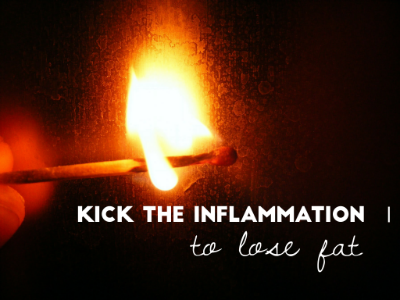There are many brilliant people in the world who agree that obesity, diabetes and insulin resistance are associated with metabolic inflammation. What is less agreed upon is what comes first? Does inflammation lead to obesity and diabetes or is it a result of the conditions?
The answer, of course, it depends.
Obesity and Inflammation
Obesity is, at it’s most basic level, an increase level of lipid storage within adipocytes (fat cells). This can happen for a number of reasons, most of which includes hormonal imbalances and over nutrition, or over doing certain foods that aggravate your personal hormonal imbalances. When fat cells become enlarged, and when insulin resistance begins to change not only the metabolic, but also the hormonal profiles in the body, an increased level of inflammatory markers can be measured in the blood stream1. This is an example of how obesity can cause inflammation. On the other side of that coin though, studies have been done on groups of people, known as metabolically healthy obese, and therefore we know that obesity does not always cause inflammation.
It is often not a surprise to people that obesity and type 2 diabetes cause inflammation. What fascinates me more is how inflammation can cause obesity! This was personally fascinating to me, as an autoimmune disease, a very inflammatory condition, was at the very basis of my fat loss struggles, and obesity for a long time!
Inflammation Preceding Obesity.
Clinically, I see relatively lean people struggle with persistent and steady weight gain almost every day! When these people have made no changes to their diet, had no changes in stress levels, and also have other symptoms such as bloating, gas, constipation/diarrhea (sorry Naturopaths LOVE to talk poo!), muscle and joint aches I tend to think about inflammation. In some people this weight gain can cause them to creep up into the overweight and even obese category over the course of years. This clinical data supports that inflammation can lead to obesity, but what does the research say?
First of all, we know that even if you are a lean person, eating more food than your body requires can cause inflammation, insulin resistance and weight gain2. Interestingly enough, it is not the calories that are the direct correlation, but where those calories come from. For example, many people have done high fat, high calorie personal experiment diets and showed that weight gain was not proportional with expectations (see here for example). When calorie composition is higher in carbs with moderate fat and protein, the inflammation and weight gain may be more likely to occur. More research needs to be done in this area, but, if further supported then this suggests that inflammation may be instrumental to the weight changes.
Additionally, we also see that in those with high circulating inflammatory markers, there is a higher likelihood of weight gain in the future3. This is true in the ‘healthy population’, but also for people with chronic low grade infections and some autoimmune diseases4. Although we do not know the exact mechanisms behind this, one thing we do know, is that inflammation can contribute to insulin resistance, and that significant increases the risk of obesity.
Lower inflammation, lower obesity?
The ultimate test of a theory is to say okay, add in inflammation and get obesity, remove inflammation and reduce obesity? This is what many researchers have done over the years, and continue to do. At one point high levels of anti-inflammatory medications (NSAIDS) were being given to help with obesity, but the side effects of those interventions can be detrimental to the intestinal tract. Now research is being done on pharmaceuticals such as statins and other diabetes medications, showing that they work through lowering inflammation levels!
Moral of the story.
When it comes to obesity, and patterns of fat loss, it is critical to understand how inflammation may play into your individual weight loss resistance. Whether your weight gain began due to excess calorie consumption, or it is more linked to genetics or an inflammatory disease, you can get caught in a cycle of inflammation that requires an intervention to break.
Do you believe inflammation is hindering your weight loss? Let me know in the comments. Also stay tuned for next weeks article of breaking inflammatory cycles to break into weight loss.
References
- Bastard, J.-P. et al. Recent advances in the relationship between obesity, inflammation, and insulin resistance. Eur. Cytokine Netw. 17, 4–12 (2006).
- Boden, G. et al. Excessive caloric intake acutely causes oxidative stress, GLUT4 carbonylation, and insulin resistance in healthy men. Sci. Transl. Med. 7, 304re7 (2015).
- Engstrom, G. et al. Inflammation-sensitive plasma proteins are associated with future weight gain. Diabetes 52, 2097–2101 (2003).
- Sattar, N., McCarey, D. W., Capell, H. & McInnes, I. B. Explaining How ‘High-Grade’ Systemic Inflammation Accelerates Vascular Risk in Rheumatoid Arthritis. Circulation 108, 2957 LP-2963 (2003).

